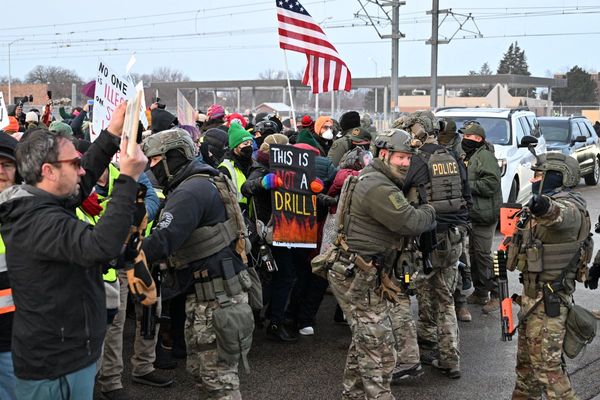
I was lost for words for a few days. Friends from Britain and elsewhere shared concern and asked for information and context. I am not used to having my words fail me, but they did this time. I read incisive articles in Hebrew from wiser friends. I just wanted to crawl under a rock and cry. Today, the words finally came.
I was in Jerusalem on Friday night, and my niece Maya, 11, wanted to host me for the night in her newly decorated bedroom, across from my mother’s flat. I woke up in the early morning to the sound of an alarm. Maya pulled a face and waved her hand dismissively but then, almost automatically, got up and led the way to the “safe space” on the stairs, where my family, with the other neighbours in the eight-floor building, gathered, and we waited for the explosion sound that told us we could go back to the flat. It happened six more times throughout the morning.
My aunt, who was visiting us, was silently mouthing at me that we should look after my mum, who had lost her arm in 1967 in similar circumstances. But my mum just took the washing out of the washing machine and went to hang it on the roof, as you do.
Meanwhile, news started streaming in from the south. Horrors that defy belief, terrorists in kibbutzim and towns on the Gaza border, families hiding in safety rooms, families being killed en masse, hostages being taken into Gaza. Some people I know, some relatives of friends. A friend’s uncle hiding under a capsized boat; a friend’s friend listened over the phone as her sister’s family was murdered; a friend’s nephew killed at a rave, a cousin’s daughter escaped the same rave by the skin of her teeth.
Message by message, the catastrophe unfolds. What we couldn’t imagine, but always knew: that if you keep 2 million people in the largest concentration camp on Earth and bomb to death thousands of them on occasion, you create a volcano that is bound to erupt in your face one day, causing horrific atrocities in its wake. But this was only half the reckoning.
The other hit most Israelis much harder: the apparatus of the state had failed. People in the south were hiding in safe rooms, under beds and in wardrobes, hoping and believing that help was coming; that in this kind of situation, the army and police would come to their rescue within minutes. But no one came.
They had to wait for a whole day, calling television newsrooms and whispering their cries for help; many did not survive. The army was nowhere in sight. A few units were obliterated by the invading Palestinian forces, but most of the army was stationed far away in the West Bank, securing settlers’ provocations at the heart of Palestinian villages.
The prime minister appeared on television promising vengeance, rivers of blood and balls of fire, to people who were still being held captive and whose loved ones were taken hostage – without even mentioning what he was going to do to save them from this plight. Ever since, the huge mismanagement of the country under his reckless government has been exposed. Reserve soldiers complain of a lack of supplies, civilians volunteer to prepare food for them and others who were uprooted and abandoned. The government is after a victorious image of destruction in Gaza, as if we have not been shown the outcomes of such massacres thousands of times, to no avail.
A cabinet minister says: “We have to be cruel now and not consider the captives over much.” His words evoke the controversial “Hannibal directive” – which compels Israeli army units to do whatever is necessary to recover an abducted soldier, dead or alive.
But feeding the desire of some Israelis for revenge is not going to save Benjamin Netanyahu and his cronies.
This day of reckoning, like that of 1973, will be their day of doom, too. The protests that engulfed Israel over the past few months, and which have now turned into a determined spirit of helpfulness and volunteering, will turn back at them. Whether it comes with a new understanding of the futility of the occupation and the blockade of Gaza is another question. Israelis often say that Arabs only understand the language of force, but this is, more often than not, a sad reflection of our own nature.
My flight back to the UK was booked for Saturday night, and I made it, leaving my family behind with a heavy heart. While waiting to board, there was another alarm. Who knew the safe space at the airport was the duty-free shop? While I was wondering whether this was just a clever marketing ploy, I got a message from my brother and another friend. The rocket we were sheltering from had landed just between their houses.
Attila the cab driver picked me up at Luton and was full of chat. Mainly, he wanted to know why people hurt each other. Had I known, maybe I’d have had the heart to quote Rihanna at him: “Shut up and drive.”
Sunday was all about doing the washing, distracting myself by watching the football with friends, and calling my father in Israel to tell him the one bit of good news of the weekend: West Ham drew against Newcastle. I am grateful that the floor for vulnerable people in his care home is underground. He is safe there. “Describe that second goal to me,” he asked, and again came the tears. I am terrible at describing goals; and at holding back tears.
On Wednesday, I am to speak and perform at a conference at Brunel University about my PhD research, which is about immigrants’ standup comedy in the UK. I have no idea how I am going to do it. The only thing that comes to my mind are the words of French,Jewish philosopher Emmanuel Levinas, which I came across in my research into communication with the “other”, whether through laughter or any other embodiment of experience: “The face of the other in its precariousness and defencelessness is for me at once the temptation to kill and the call for peace, the ‘thou shall not kill’.”
Nothing seems more far-fetched at the moment than peace and the injunction against killing, but there will be no life at all if we do not make it so.
Daphna Baram is a Jerusalem-born former human rights lawyer, journalist and standup comedian, and a PhD researcher at Lancaster University. Her book Disenchantment: the Guardian and Israel was published in 2004 (Guardian Books)
Do you have an opinion on the issues raised in this article? If you would like to submit a response of up to 300 words by email to be considered for publication in our letters section, please click here.







